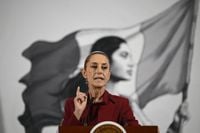As President Claudia Sheinbaum marks her first anniversary at the helm of Mexico, the relationship between her administration and its northern neighbor, the United States, has become a crucible for some of her most consequential decisions. The past year has been anything but routine, as Sheinbaum has navigated a series of crises and diplomatic flare-ups—none more pressing than the renewed tensions with U.S. President Donald Trump and the fate of Mexican migrants living across the border.
On September 24, 2025, Sheinbaum addressed the Mexican press with a grave message: her government had sent diplomatic notes to Washington demanding investigations into the recent deaths of two Mexican nationals following U.S. Immigration and Customs Enforcement (ICE) operations. According to Xinhua and Reuters, these incidents included the fatal shooting of Silverio Villegas Gonzalez, a Michoacan native gunned down by an ICE agent in a Chicago suburb on September 12, just after dropping his children off at school, and the death of Ismael Ayala-Uribe, who passed away in a U.S. hospital, presumably as a result of detention.
"We sent a diplomatic note on this case asking all the investigations be carried out, and that if there is a responsibility of violation of human rights, that it be sanctioned," Sheinbaum stated at her morning press conference, as reported by Reuters. The president lamented the criminalization of migrants in the United States and made it clear that Mexico would not stand idly by. "We oppose such treatment and the raids that have been carried out which, in addition, cause fear and anxiety," she said, according to Xinhua.
These deaths have become flashpoints in a broader, simmering dispute over U.S. immigration policy. Trump’s return to the White House in January 2025 has brought with it a resurgence of hardline tactics: mass deportations, workplace raids, and a rhetorical posture that paints undocumented migrants as threats. The White House has demanded that Mexico do more to stem the flow of migrants from Central America and accept greater numbers of deportees. Sheinbaum, for her part, has condemned these operations, expanded consular services, and established an emergency hotline to support Mexicans in the U.S., offering both technical and legal advice to those caught in the crosshairs of enforcement.
But the strain is not just humanitarian. The aggressive U.S. approach has had economic reverberations on both sides of the border. Sheinbaum has repeatedly highlighted, as Xinhua notes, that anti-immigrant policies are hurting American business owners in agriculture and service industries, where labor shortages are becoming acute. "Business owners in agriculture and services are reporting problems because they cannot hire workers," she said, underscoring the interconnectedness of the two economies. Mexicans in the U.S.—whether first, second, third, or even fourth generation—make vital contributions to both countries, not only through their labor but also through the billions of dollars in remittances sent home each year.
Yet, the diplomatic balancing act has come at a political cost for Sheinbaum. At home, critics have accused her of being too conciliatory toward Washington, especially during the latest trade dispute. When Trump reimposed punitive tariffs on Mexican exports shortly after returning to office, Mexico’s manufacturing sector braced for the worst. The move rattled markets and threatened to spiral into a full-blown trade war. Rather than retaliate with tariffs of her own, Sheinbaum chose direct diplomacy, engaging in tense negotiations with Trump. After a particularly fraught phone call, she managed to secure exemptions for critical Mexican exports under the United States-Mexico-Canada Agreement (USMCA), averting immediate economic disaster. Still, some at home saw this as a sign of weakness rather than statesmanship.
According to El Universal and Latin Times, Sheinbaum described these moments as among the hardest of her presidency. When asked what her toughest decision had been, she reflected, "More than complex, I think there are important decisions about how you must behave. The different moments we had of negotiation with President Trump were obviously tense moments, where you have to decide what you do and what attitude you take in a negotiation." The pressure to defend national sovereignty while maintaining the stability of the North American economy has been a constant, high-stakes calculation.
The security dimension of U.S.-Mexico relations has also escalated. In a move that alarmed many in Mexico, Trump designated several Mexican cartels as foreign terrorist organizations in 2025. This raised fears that the U.S. could use the designation as a pretext for military intervention south of the border. Sheinbaum responded forcefully, declaring, "Mexico will not stand for any invasion disguised as cooperation." Her administration even proposed constitutional reforms to reinforce protections against foreign action, drawing a clear red line against any potential breach of sovereignty.
Amid these bilateral challenges, Sheinbaum has not neglected domestic reforms. She has pushed for a sweeping judicial overhaul, arguing that it was mandated by the popular will. The reform would limit courts' power to overturn constitutional amendments, a move that has sparked fierce debate. Opposition parties have warned that the measure threatens the separation of powers, but Sheinbaum has pressed ahead, saying, "The decision that there was a popular mandate for judicial reform and that there was no turning back was also very important." Her willingness to spend political capital on such contentious changes signals her commitment to structural transformation, even in the face of criticism.
Looking ahead, the challenges show no sign of abating. The USMCA is scheduled for review in 2026, and Trump has already signaled his intention to push for tougher terms, setting the stage for another round of high-stakes negotiations. Migration flows from Central America remain high, ensuring that border policy will stay at the top of the agenda. Meanwhile, the debate over security cooperation is likely to intensify as cartel violence continues to plague both countries.
For Sheinbaum, the hardest decisions may still be on the horizon. Her first year in office has been a trial by fire, defined by a relentless series of diplomatic, economic, and humanitarian tests. Through it all, she has sought to balance pragmatism with principle—defending the rights and dignity of Mexicans abroad, safeguarding her country’s sovereignty, and steering Mexico through turbulent geopolitical waters. As the next chapter unfolds, the eyes of both nations will remain fixed on how she navigates the storms to come.




